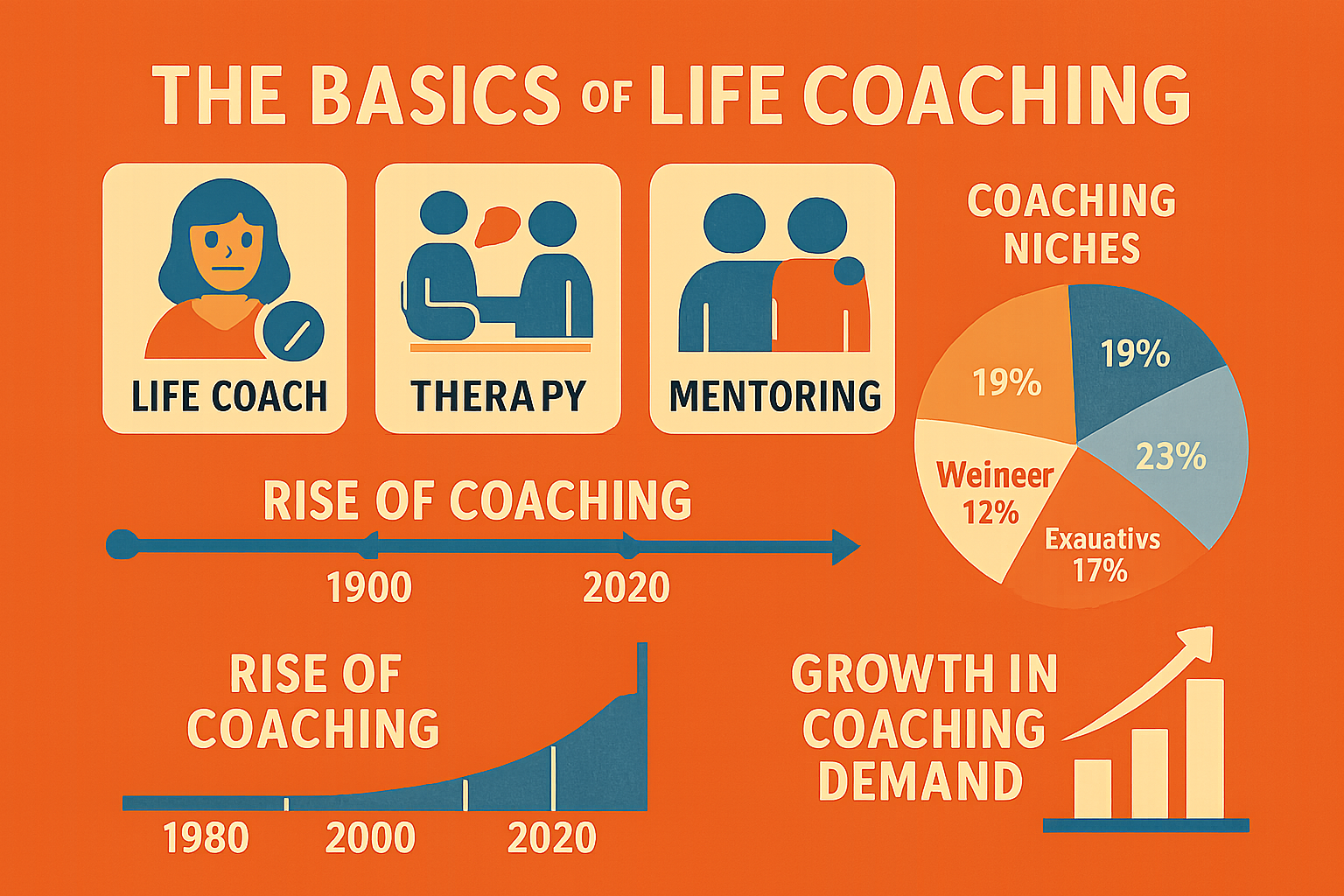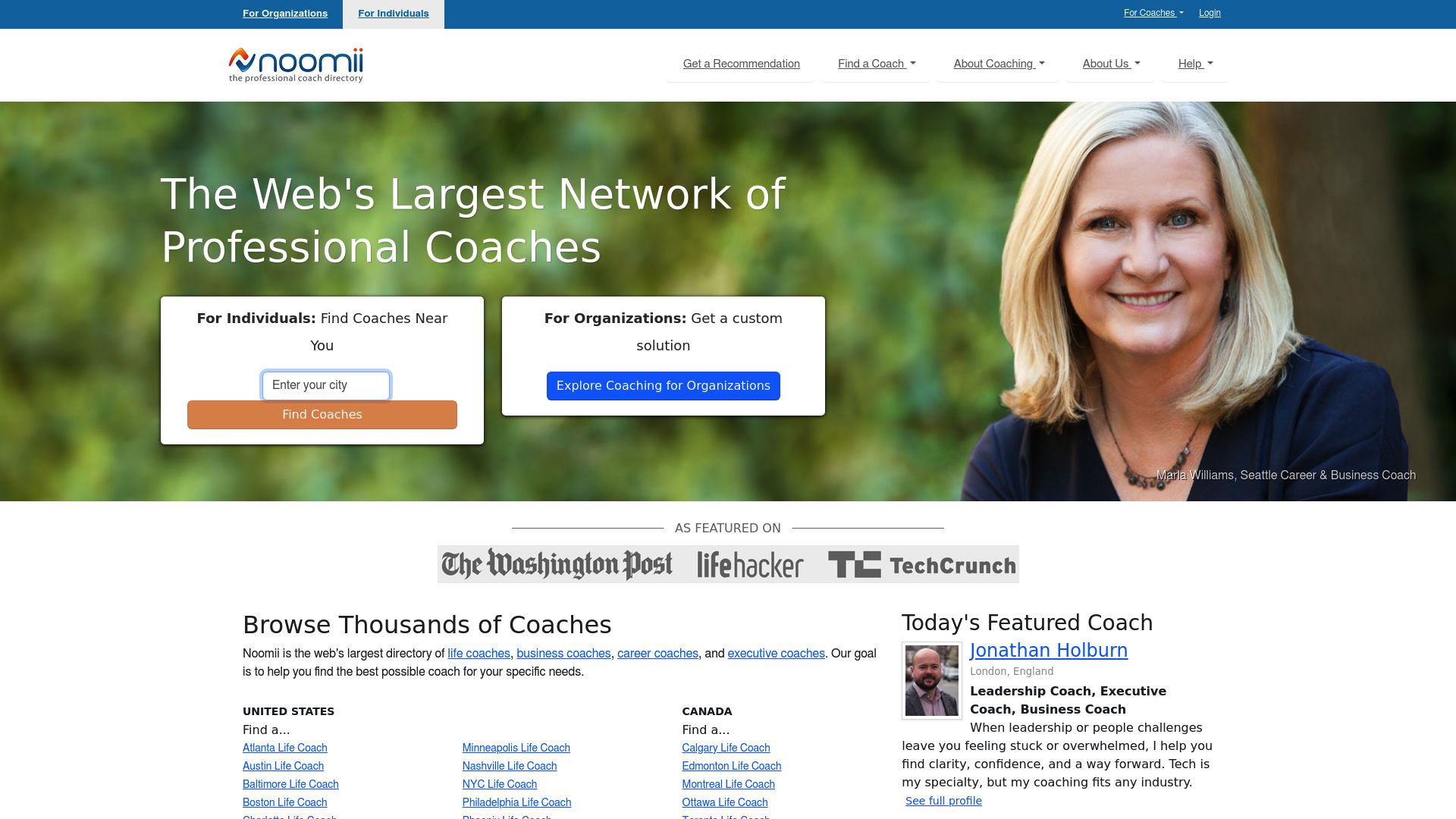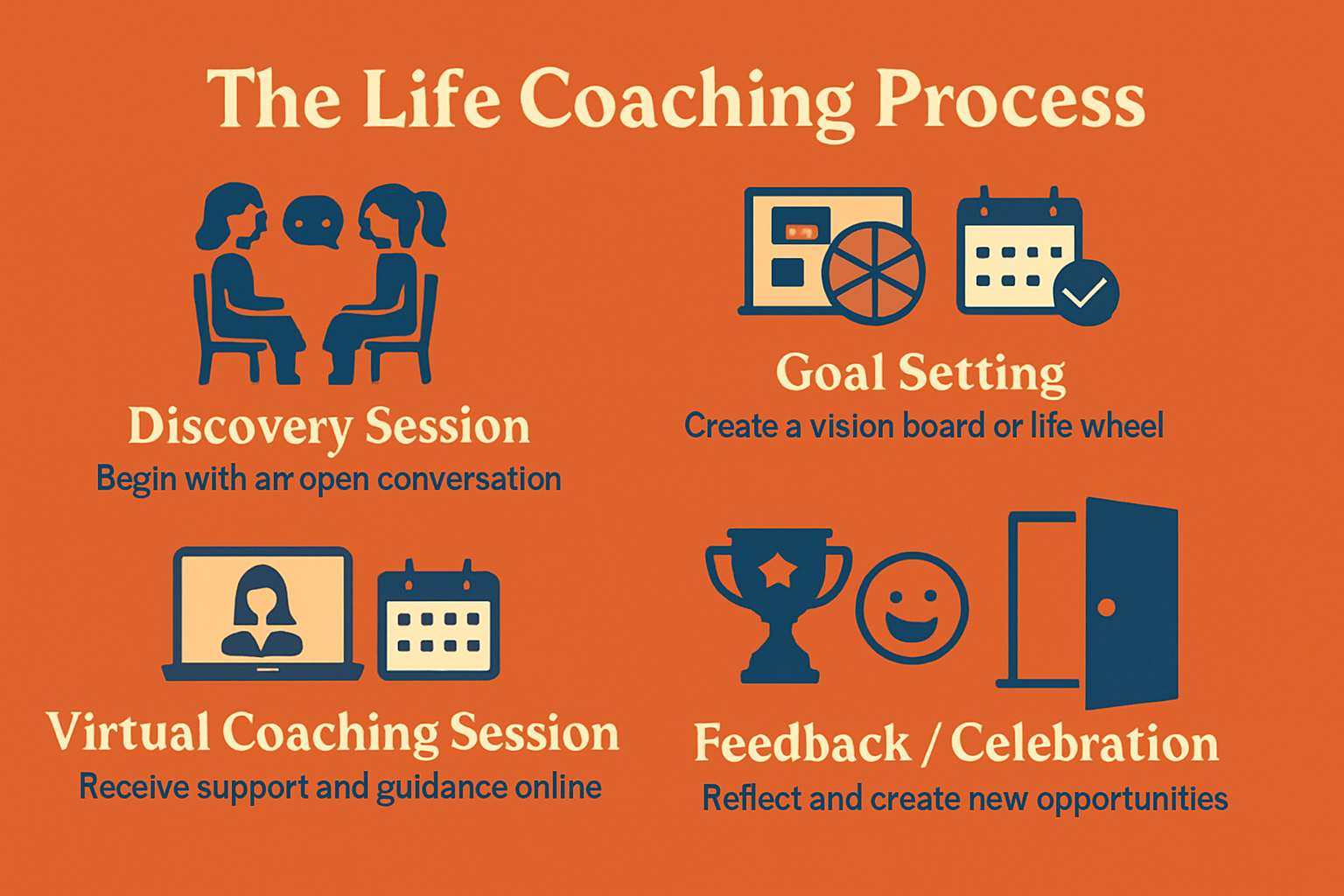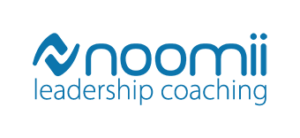The Ultimate Guide to Your Life Coach for Beginners (2025)
Imagine unlocking your true potential and living a more fulfilled, purpose-driven life. What if just one conversation with your life coach could set you on that transformative path?
This guide will demystify life coaching for beginners in 2025. We’ll show you what life coaching is, highlight its proven benefits, and reveal how to choose and work with the right coach.
Ready to turn curiosity into action? Let’s explore the steps that can help you start your journey toward greater clarity, motivation, and personal growth.
What Is a Life Coach? Understanding the Basics
Curious about what sets your life coach apart from other helping professionals? Understanding the basics is the first step to seeing how this supportive relationship can transform your journey.

Defining Life Coaching
A life coach is a trained professional who partners with you to help clarify goals, overcome obstacles, and unlock your potential. Unlike therapy, which focuses on healing past wounds, your life coach is future-oriented, guiding you toward meaningful change. While mentors share advice from experience and consultants provide solutions, your life coach empowers you to discover answers within yourself.
Professional standards are crucial in this field. The International Coach Federation (ICF) sets global benchmarks for ethics, training, and conduct, ensuring your life coach operates with integrity and confidentiality. According to the ICF Global Coaching Study 2023, coaching continues to grow in credibility and impact worldwide.
Life coaching has evolved rapidly since the late 20th century, gaining momentum as people seek more personalized, holistic support. Today, your life coach might help clients navigate career changes, build confidence, or achieve personal milestones. For example, a teacher who felt stuck in her career found new purpose and direction after partnering with a life coach, illustrating the profound shifts possible through this process.
Types and Specializations in Life Coaching
Your life coach may specialize in specific areas to better serve your unique needs. Common coaching niches include personal development, career advancement, executive leadership, wellness, and relationships. Each specialization shapes the coaching process, tailoring strategies to fit your life stage and aspirations.
Specialized coaches bring targeted expertise. For instance, a career coach focuses on professional transitions, resume building, and interview skills, while a wellness coach emphasizes healthy habits and stress management. The demand for niche coaching continues to rise, with career coaching alone seeing a 20% increase in 2024.
Choosing your life coach based on their area of expertise can lead to more effective outcomes. Imagine the difference between working with a generalist and a coach who truly understands your industry or personal goals. This alignment ensures that your life coach provides not just motivation but practical, actionable support tailored to your journey.
Who Can Benefit from a Life Coach?
Nearly anyone can benefit from the guidance of your life coach. Whether you’re at a career crossroads, facing a major life transition, or simply seeking personal growth, a coach provides structure and encouragement to move forward.
Organizations are also recognizing the value of coaching, using your life coach to foster leadership, improve team dynamics, and support employee development. In fact, 70% of individuals who work with a coach report improved work performance, according to industry research. This demonstrates that the benefits of your life coach extend well beyond individual achievement.
Ultimately, coaching is universal. From teachers and executives to entrepreneurs and parents, your life coach can help unlock potential, build resilience, and create lasting change—no matter where you start.
The Benefits of Working with a Life Coach
Unlocking your full potential often requires more than just good intentions. Working with your life coach can be the catalyst that transforms your ambitions into real achievements. This section explores the diverse benefits of partnering with a coach, from personal growth to improved well-being.
![]()
Personal and Professional Growth
Your life coach acts as a partner in your journey toward meaningful change. Through guided conversations and structured exercises, coaches help you set clear, achievable goals that align with your values.
Many clients report breakthroughs in self-confidence and resilience after working with their life coach. For example, someone struggling with imposter syndrome might develop the skills and self-belief to pursue a new career path. Over time, these small wins add up to significant personal and professional growth.
- Set purposeful goals
- Build lasting confidence
- Develop emotional intelligence
Accountability and Motivation
Staying on track is easier when your life coach is by your side. Coaches provide structured accountability by regularly checking in on your progress and helping you troubleshoot obstacles.
They use techniques like progress tracking, personalized reminders, and motivational interviewing to keep you engaged. With your life coach holding you accountable, you’re more likely to follow through on commitments and maintain momentum, even when challenges arise.
- Regular check-ins to measure growth
- Encouragement and positive reinforcement
- Solutions tailored to your motivation style
Overcoming Obstacles and Limiting Beliefs
Everyone faces mental barriers that can block progress. Your life coach specializes in identifying and dismantling these limiting beliefs. Using frameworks like the GROW model or SMART goals, they guide you to reframe negative thinking and build new, empowering perspectives.
Imagine a client who wants to change careers but fears failure. With the support of your life coach, they learn to challenge those fears, map out a strategy, and take confident action. Overcoming such obstacles opens doors to new opportunities.
- Identify hidden barriers
- Apply proven coaching frameworks
- Foster a growth mindset
Enhanced Decision Making and Clarity
When life feels overwhelming, your life coach brings clarity to the chaos. Coaches use powerful questioning and reflection exercises to help you evaluate options, weigh potential outcomes, and make informed decisions.
With your life coach guiding the process, you’re less likely to feel stuck or indecisive. This clarity leads to more confident choices in both your personal and professional life, setting the stage for long-term success.
- Structured reflection exercises
- Improved problem-solving skills
- Clearer sense of direction
Improved Work-Life Balance and Wellbeing
Stress and burnout are common challenges, but your life coach offers practical strategies for restoring balance. By addressing time management, setting boundaries, and prioritizing self-care, coaches help you create a more harmonious daily life.
Recent research highlights the connection between coaching and mental well-being. For deeper insights, explore these Coaching and Mental Well-Being Insights from the latest ICF study. With your life coach’s support, you’re more likely to experience lasting improvements in happiness and overall satisfaction.
- Reduce stress and avoid burnout
- Prioritize personal well-being
- Achieve sustainable work-life integration
How to Choose the Right Life Coach for You
Selecting your life coach is a journey of self-discovery and empowerment. The right coach can make all the difference in your growth, so it’s worth taking time to reflect and research. Here’s how to approach this important decision.
Assessing Your Needs and Goals
Before you start searching for your life coach, take a moment to clarify what you want to achieve. Are you seeking personal growth, career advancement, or better work-life balance? Write down your top goals and consider what kind of support you need.
Ask yourself:
- What areas of my life do I want to improve?
- Am I open to new perspectives and honest feedback?
- What would success look like after working with your life coach?
Reflecting on these questions helps you define your coaching objectives. The clearer you are, the easier it is to find your life coach who aligns with your vision. Remember, this process is about you and your journey.
Credentials, Certifications, and Experience
Not all coaches have the same training or background. When evaluating your life coach options, check for credentials from reputable organizations like the International Coach Federation (ICF). Certification ensures that your life coach adheres to ethical standards and employs proven methods.
Consider these differences:
| Criteria | Certified Life Coach | Non-Certified Coach |
|---|---|---|
| Training Hours | 60+ | Varies |
| Code of Ethics | Yes | Not guaranteed |
| Ongoing Education | Required | Optional |
Experience also matters. Ask your life coach about their past clients, coaching style, and success stories. This transparency will help you feel more confident about your choice.
Researching and Comparing Coaches
Now it’s time to explore the options. Start by browsing online directories, reading testimonials, and asking for referrals. Many people find their life coach through word of mouth or platforms dedicated to coaching professionals.
Look for coaches who specialize in your goals and values. Compare their profiles, read about their coaching philosophies, and ask how they approach challenges similar to yours. For a curated list of professionals, you can browse Life coaches near you to see verified profiles and client reviews.
Take notes as you go, and shortlist the coaches who resonate with your needs. This step is about finding your life coach who feels like the right fit for your journey.
Interviewing Potential Coaches
Before committing, schedule discovery calls with your top picks. These initial conversations are a chance to see if your life coach’s communication style matches your preferences. Prepare questions such as:
- What is your coaching process?
- How do you handle setbacks or resistance?
- What results have your clients achieved?
Pay close attention to how you feel during the call. Do you feel heard and supported? Is there genuine rapport? Trust your instincts—your life coach should inspire confidence and trust.
Red flags to watch for include vague answers, lack of structure, or discomfort discussing goals. A good coaching relationship starts with transparency and mutual respect.
Understanding Pricing, Packages, and Contracts
Life coaching comes in many pricing models. Some coaches charge hourly rates, while others offer packages or monthly retainers. In 2025, typical rates range from $75 to $300 per session, depending on experience and specialization.
Ask your life coach for a clear breakdown of costs. Review contracts carefully, paying attention to cancellation policies and confidentiality agreements. Some coaches offer sliding scales or introductory sessions—don’t hesitate to inquire.
Here’s what to expect:
- Hourly sessions: Pay-as-you-go flexibility
- Packages: Bundled sessions at a discount
- Retainers: Ongoing monthly support
Understanding these details ensures you and your life coach are on the same page from day one.
Find a Life Coach Easily with Noomii
If you’re new to coaching, platforms like Noomii can simplify your search. Noomii is the world’s largest online coach directory, designed to match beginners with the right support. Their SmartMatch™ service pairs you with your life coach based on your goals, location, and preferences.

Benefits of using a trusted platform include:
- Verified profiles and credentials
- Honest testimonials from real clients
- Access to coaches worldwide
To get started, create a profile, specify your needs, and connect with coaches who meet your criteria. Many users appreciate the safe, efficient, and personalized experience Noomii offers when looking for your life coach.
What to Expect: The Life Coaching Process Step-by-Step
Embarking on a journey with your life coach can feel both exciting and a little mysterious. Understanding what to expect will help you approach the process with confidence and curiosity. Here’s a clear, step-by-step look at how a typical coaching relationship unfolds.

The Discovery Session
Your first meeting with your life coach is all about building trust and setting the stage for growth. This session typically focuses on understanding your background, current challenges, and aspirations. It’s a relaxed conversation where you and your coach clarify what you want to achieve.
You’ll discuss topics such as:
- What motivates you?
- What areas do you want to improve?
- What does success look like for you?
Your life coach will ask powerful questions to get you thinking deeply about your goals. This session is also a great time to get comfortable with your coach’s style and see if it’s a good fit for your journey.
Setting Goals and Creating an Action Plan
Once you’ve established rapport, your life coach will guide you in turning dreams into actionable goals. Together, you’ll break down big ambitions into clear, manageable steps.
Common tools your life coach might use:
- Vision boards to visualize your future.
- The life wheel to assess balance across life areas.
- Action plans for tracking progress.
For example, if you want more confidence at work, your life coach can help you set a specific goal, such as leading a meeting, and outline steps to get there. This part of the process builds clarity and momentum.
Regular Coaching Sessions and Progress Tracking
Consistency is key for transformation. You’ll meet with your life coach regularly—often weekly or biweekly—either online or in person. Most coaching is now virtual, making it accessible wherever you are.
Each session, you’ll:
- Review progress since the last meeting.
- Address any challenges or obstacles.
- Set new tasks or intentions for the week.
Your life coach may use digital tools or journals to help you track your progress. These check-ins keep you accountable and motivated, ensuring you stay on course toward your goals.
Feedback, Adjustments, and Celebrating Wins
Growth isn’t linear, and your life coach will support you through every twist and turn. Expect honest, constructive feedback and encouragement to help you stretch your comfort zone.
Your coach will:
- Adjust strategies if something isn’t working.
- Celebrate your achievements, big or small.
- Encourage reflection on what you’ve learned.
For example, reaching a milestone like finishing a challenging project is a moment your life coach will help you recognize and savor. This celebration of progress fuels your ongoing motivation.
Ending or Pausing the Coaching Relationship
Eventually, you may feel ready to pause or conclude coaching. Signs include achieving your major goals or feeling confident to continue on your own. Your life coach will help you reflect on your journey and plan your next steps.
Best practices for a positive transition:
- Review your growth and accomplishments.
- Discuss how to sustain progress.
- Agree on ways to reconnect if new challenges arise.
A thoughtful ending helps you step forward with lasting confidence and clarity. Your life coach remains a resource for future growth whenever you need support.
Tips for Maximizing Your Life Coaching Experience
Unlocking the full potential of your life coaching journey requires a proactive approach and a mindset geared toward growth. Use these expert tips to ensure your partnership with your life coach delivers lasting results and meaningful transformation.
Cultivating the Right Mindset
Approaching your life coach with openness and honesty creates fertile ground for personal growth. Embrace vulnerability and be willing to explore new perspectives, even when it feels uncomfortable.
A growth mindset is essential—view challenges as opportunities to learn rather than obstacles. When you believe change is possible, your life coach can help you unlock strengths you never realized you had.
Small mindset shifts can accelerate your progress and make each session more impactful.
Being Proactive and Engaged
Take an active role in your coaching journey. This means showing up prepared, completing any exercises or “homework” between sessions, and reflecting on what you learn.
Set reminders for tasks and milestones so you stay on track. Engaged clients see more progress because they treat your life coach as a partner, not just a guide.
Ask questions, share feedback, and bring up new goals as they arise. The more energy you invest, the greater your results.
Building a Strong Coach-Client Relationship
A successful coaching experience relies on trust, respect, and open communication. Be honest about your needs and expectations with your life coach from the start.
Regularly discuss what’s working and where you need more support. Constructive feedback helps both you and your coach grow together.
When both parties are invested in collaboration, your life coach can tailor their approach, making your sessions uniquely effective.
Leveraging Technology and Tools
Enhance your journey with digital tools—journals, apps, and online platforms can help you track progress and reflect on insights. Many clients find that integrating tech solutions encourages accountability and keeps goals visible.
Explore holistic approaches to coaching to find methods that resonate with your learning style. For more on this, check out Holistic life coaching explained for insights on blending modern tools with holistic strategies.
By combining these resources with guidance from your life coach, you create a supportive and dynamic environment for change.
Measuring Progress and Outcomes
Tracking your achievements is crucial for maintaining motivation. Work with your life coach to set clear benchmarks and regularly review your progress.
Use goal-tracking apps, progress charts, or simple journaling to visualize your journey. Regular check-ins help you recognize growth, adjust strategies, and celebrate milestones along the way.
Seeing tangible results reinforces your commitment and highlights the value of your life coach.
Common Pitfalls and How to Avoid Them
Be mindful of common obstacles that can limit your success. Unrealistic expectations, lack of commitment, or a poor fit with your life coach can slow your progress.
- Set clear, achievable goals from the outset.
- Stay consistent and communicate openly.
- If something isn’t working, address it early.
Remember, the right partnership and a dedicated approach keep your life coach experience positive and productive.
Life Coaching Trends and the Future Outlook for 2025
The world of your life coach is evolving rapidly, driven by innovation, shifting client needs, and a global push for personal growth. As we look ahead to 2025, these trends are shaping how coaches and clients connect, collaborate, and create lasting change. Whether you’re considering becoming or working with your life coach, understanding these trends can help you make the most of this transformative partnership.
Digital Transformation of Coaching
Virtual coaching is now the new normal for your life coach experience. Over 90% of coaching sessions happen online, making support more accessible than ever. AI-powered tools, from chatbots to scheduling assistants, are supplementing human coaches, offering personalized guidance between sessions. Coaching apps track goals, send reminders, and foster accountability, turning your device into a motivational companion. Wearables and smart devices now sync with coaching platforms, enabling your life coach to offer data-driven feedback on wellbeing and habits. This digital wave is making coaching more flexible, efficient, and tailored to your unique needs.
Emerging Niches and Specializations
In 2025, your life coach is likely to have a focused niche. Popular areas include wellness, diversity, equity & inclusion (DEI), financial coaching, and youth development. According to IBISWorld, demand for wellness coaches rose by 30% in 2024. Coaches now offer highly specialized services, from mindfulness for teachers to financial planning for millennials. This specialization ensures your life coach can address your specific goals with greater expertise and proven frameworks. It also means clients can seek coaches who truly understand their unique backgrounds and aspirations, fueling a more personalized journey.
Popular Coaching Niches Table:
| Niche | Growth Rate (2024) |
|---|---|
| Wellness | 30% |
| Career | 20% |
| Financial | 18% |
| DEI | 15% |
Coaching for Organizations and Teams
Businesses and nonprofits are investing in your life coach services to boost leadership, foster DEI, and increase retention. Executive and business coaching is expanding beyond C-suite leaders to include mid-level managers and diverse teams. One company, for example, reported a 25% drop in turnover after implementing team coaching. Organizations rely on your life coach to facilitate employee engagement, navigate change, and build resilient cultures. These programs often blend group workshops with one-on-one sessions, maximizing both individual and collective growth.
Globalization and Accessibility
Coaching is no longer limited by borders. Platforms and virtual tools have made it possible for your life coach to work with clients worldwide. This accessibility is especially beneficial in developing regions, where professional coaching was previously out of reach. The industry is seeing significant global expansion, making coaching more affordable and inclusive for diverse populations. According to Professional Coaching Global Expansion, the coaching profession has grown rapidly across continents, opening doors for educators, women, and heart-led leaders everywhere.
Certification, Regulation, and Professional Standards
As your life coach industry matures, stricter certification and regulation are becoming the norm. The International Coach Federation (ICF) and similar bodies now require rigorous training, ethics, and ongoing education. Clients are increasingly seeking coaches with recognized credentials, knowing it leads to better results and safer experiences. Professional standards help ensure your life coach relationship is built on trust, confidentiality, and measurable outcomes. This trend is raising the bar, making coaching a respected, evidence-based profession.
The Evolving Role of Technology in Coaching Relationships
Technology is enhancing how your life coach supports your growth. Wearables such as fitness trackers supply real-time data on stress, sleep, and activity, which coaches use to tailor strategies. Virtual reality (VR) is emerging as a tool for immersive visualization and confidence-building exercises. Data analytics platforms help track progress and reveal patterns, creating a more objective view of your journey. By integrating tech, your life coach can offer more precise, actionable feedback, making sessions more engaging and effective.
Predictions for the Coaching Industry in 2025 and Beyond
Looking ahead, the coaching market is set to grow even further. Industry reports predict a rise in both the number of coaches and the diversity of services offered. According to the Life Coaches in the US Market Report, the sector is poised for continued expansion, driven by demand for specialized, accessible coaching. Your life coach will increasingly use smart tools, collaborate globally, and serve new demographics. Leaders in the field anticipate more innovation, stronger regulation, and a deepening focus on measurable impact. If you’re ready to embrace your life coach journey, the future has never been brighter.
Now that you know what to look for in a life coach and how powerful the right match can be, why not take a concrete step toward your own growth or helping others do the same? If you’re a coach ready to connect with motivated clients and build your practice, it’s never been easier to get started. A free listing gives you visibility in a trusted network, making it simple for people searching for guidance to find you. Let’s make 2025 the year you reach more people—Get Your Free Listing and take your coaching journey to the next level!

Leave a Reply
Want to join the discussion?Feel free to contribute!